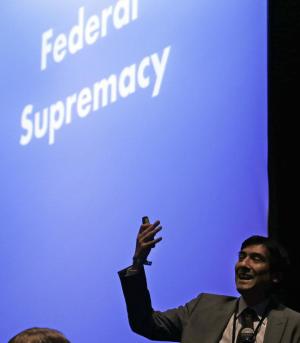TULALIP, Wash. (AP) — The Justice Department's announcement in December that it would allow the nation's Indian tribes to legalize and regulate marijuana on their reservations brought notes of caution — if not silence or opposition — from many tribes.
They were reluctant given the substance-abuse problems that already plague many reservations.
But the attendance at a conference on the topic Friday gave an early indication of just how many might be weighing it, even if a thicket of potential legal issues remain.
Representatives of about 75 tribes from around the country converged on the Tulalip Indian Tribes' resort and casino for a $605-a-head seminar on the regulatory, legal and social issues related to pot legalization.
That's a small fraction of the nation's 566 recognized tribes. Many attendees were from smaller tribes looking for a potential economic edge.
"A great deal more are considering this than I thought would be considering it," said Ken Meshigaud, chairman of the Hannahville Indian Community, a band of the Potawatomi Tribe on Michigan's Upper Peninsula. "From an economic standpoint, it may be a good venture the tribes can get into."
View gallery

Audience members look on at a tribal marijuana conference for tribal governments considering whether …
Tulalip Vice Chairman Les Parks called it "a dream of another point of self-sufficiency on our reservations."
"That's what marijuana can do for us," he said.
Tribes have been wrestling with the idea since the U.S. Justice Department announced that it wouldn't stand in their way if they want to approve pot for medical or recreational use.
The agency said tribes must follow the same law enforcement priorities laid out for states that legalize the drug, including keeping marijuana out of the hands of children and criminal elements.
The discussions are heating up: On Monday, about 200 tribal leaders attended a meeting of the National Congress of American Indians, which included a closed-to-the-press panel discussion with Justice Department officials on marijuana legalization, said Demitri Downing, a former prosecutor for the Tohono O'odham tribe in southern Arizona who now advises tribes on regulatory issues related to pot.
View gallery

Salvador Mungia speaks at a tribal marijuana conference for tribal governments considering whether t …
The topic also is on the agenda of a major tribal economic summit in Las Vegas next month.
"We have to take a look at it," said Seth Pearman, an attorney for the Flandreau Santee Sioux Tribe in South Dakota. "The economic opportunity is just astronomical — it would be almost negligent to miss out on this."
He said tribal leaders already are drafting regulations for a marijuana industry, and they toured some Washington state dispensaries on their trip.
The conference was organized by Robert Odawi Porter, a former president of the Seneca Nation in New York, and Seattle marijuana business attorneys Hilary Bricken and Robert McVay.
Porter noted that difficult legal issues remain, especially related to tribal sovereignty. About 17 states have some criminal jurisdiction over tribal lands. If tribes are in those states, and those states prohibit marijuana, tribal members could face state criminal prosecution if they legalize or regulate marijuana, he said.
View gallery

Speakers Salvador Mungia, left, Robert Odawi Porter and Douglas Berman prepare to speak at a tribal …
Several tribes stressed they are proceeding cautiously and reluctant to outpace changes in state marijuana laws. For example, tribes might not want to legalize for recreational use if it's illegal off-reservation, said Chris Stearns, a Navajo and the chairman of the Washington State Gambling Commission.
"They can sell to non-Indians, but the second they leave the reservation they get arrested," Stearns said. "That's not a great business model."
The tribal council of the 3,200-member Hoopa Valley Tribe, in Northern California's famed Emerald Triangle, has requested recommendations from health, law enforcement and other tribal officials to consider the consequences of marijuana legalization, including whether it might jeopardize federal aid for health care, fire services or housing, said Councilman Brad Marshall.
Some tribes said they would first consider regulating cannabis for medical use. They said they were intrigued about the idea that making pot more accessible might help cut down on abuse of methamphetamine or prescription drugs among tribal members.
"We're looking at what the benefits are, not only with revenue but with the medical relief we can give to our elders," said Lewis Taylor, chairman of the St. Croix Tribe of Wisconsin.
http://news.yahoo.com/native-americ...cuss-pot-legalization-184215040--finance.html
They were reluctant given the substance-abuse problems that already plague many reservations.
But the attendance at a conference on the topic Friday gave an early indication of just how many might be weighing it, even if a thicket of potential legal issues remain.
Representatives of about 75 tribes from around the country converged on the Tulalip Indian Tribes' resort and casino for a $605-a-head seminar on the regulatory, legal and social issues related to pot legalization.
That's a small fraction of the nation's 566 recognized tribes. Many attendees were from smaller tribes looking for a potential economic edge.
"A great deal more are considering this than I thought would be considering it," said Ken Meshigaud, chairman of the Hannahville Indian Community, a band of the Potawatomi Tribe on Michigan's Upper Peninsula. "From an economic standpoint, it may be a good venture the tribes can get into."
View gallery

Audience members look on at a tribal marijuana conference for tribal governments considering whether …
Tulalip Vice Chairman Les Parks called it "a dream of another point of self-sufficiency on our reservations."
"That's what marijuana can do for us," he said.
Tribes have been wrestling with the idea since the U.S. Justice Department announced that it wouldn't stand in their way if they want to approve pot for medical or recreational use.
The agency said tribes must follow the same law enforcement priorities laid out for states that legalize the drug, including keeping marijuana out of the hands of children and criminal elements.
The discussions are heating up: On Monday, about 200 tribal leaders attended a meeting of the National Congress of American Indians, which included a closed-to-the-press panel discussion with Justice Department officials on marijuana legalization, said Demitri Downing, a former prosecutor for the Tohono O'odham tribe in southern Arizona who now advises tribes on regulatory issues related to pot.
View gallery

Salvador Mungia speaks at a tribal marijuana conference for tribal governments considering whether t …
The topic also is on the agenda of a major tribal economic summit in Las Vegas next month.
"We have to take a look at it," said Seth Pearman, an attorney for the Flandreau Santee Sioux Tribe in South Dakota. "The economic opportunity is just astronomical — it would be almost negligent to miss out on this."
He said tribal leaders already are drafting regulations for a marijuana industry, and they toured some Washington state dispensaries on their trip.
The conference was organized by Robert Odawi Porter, a former president of the Seneca Nation in New York, and Seattle marijuana business attorneys Hilary Bricken and Robert McVay.
Porter noted that difficult legal issues remain, especially related to tribal sovereignty. About 17 states have some criminal jurisdiction over tribal lands. If tribes are in those states, and those states prohibit marijuana, tribal members could face state criminal prosecution if they legalize or regulate marijuana, he said.
View gallery

Speakers Salvador Mungia, left, Robert Odawi Porter and Douglas Berman prepare to speak at a tribal …
Several tribes stressed they are proceeding cautiously and reluctant to outpace changes in state marijuana laws. For example, tribes might not want to legalize for recreational use if it's illegal off-reservation, said Chris Stearns, a Navajo and the chairman of the Washington State Gambling Commission.
"They can sell to non-Indians, but the second they leave the reservation they get arrested," Stearns said. "That's not a great business model."
The tribal council of the 3,200-member Hoopa Valley Tribe, in Northern California's famed Emerald Triangle, has requested recommendations from health, law enforcement and other tribal officials to consider the consequences of marijuana legalization, including whether it might jeopardize federal aid for health care, fire services or housing, said Councilman Brad Marshall.
Some tribes said they would first consider regulating cannabis for medical use. They said they were intrigued about the idea that making pot more accessible might help cut down on abuse of methamphetamine or prescription drugs among tribal members.
"We're looking at what the benefits are, not only with revenue but with the medical relief we can give to our elders," said Lewis Taylor, chairman of the St. Croix Tribe of Wisconsin.
http://news.yahoo.com/native-americ...cuss-pot-legalization-184215040--finance.html



